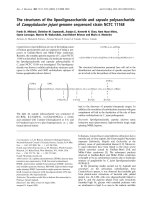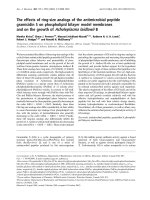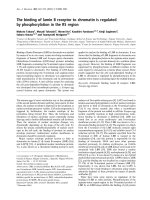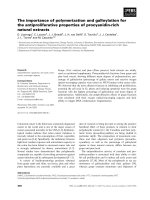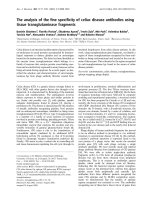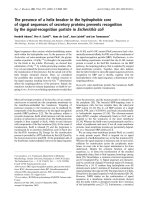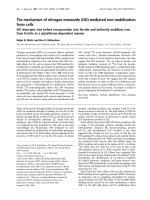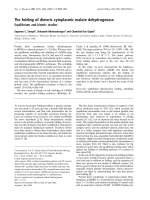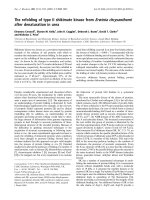Báo cáo y học: "The importance of measuring psychosocial functioning in schizophrenia" pps
Bạn đang xem bản rút gọn của tài liệu. Xem và tải ngay bản đầy đủ của tài liệu tại đây (224.86 KB, 7 trang )
REVIE W Open Access
The importance of measuring psychosocial
functioning in schizophrenia
Sofia Brissos
1,2*
, Andrew Molodynski
3
, Vasco Videira Dias
4
and Maria Luísa Figueira
4
Abstract
Background: Schizophrenia is among the most disabling of mental illnesses and frequently causes impaired
functioning. We explore issues of definition and terminology, and the relationship between social functioning,
cognition, and psychopathology considering relevant research findings.
Methods: The present article describes measures of social functioning and outlines their psychometric properties.
It considers their usefulness in research and clinical settings. Treatment aims and objectives ar e explored in the
context of cognitive and social functioning. Finally, we identify areas for developing research and refining the
measurement of social functioning.
Results: The definition and measurement of social functioning in schizophrenia remains a complex and disputed
area. The relationships between symptoms, cognitive functioning and social functioning are complex but we are
beginning to understand them better. Scales for measuring functioning in clinical practice must be brief and
sensitive to cha nge and the Personal and Social Performance (PSP) scale may offer several advantages in these
regards. Brief cognitive assessments focusing upon the domains most commonly affected in schizophrenia, such as
verbal memory and executive functions, should be coadm inistered with measures of functioning.
Conclusions: The use of validated scales for schizophrenia that are sensitive to change over the course of the
illness and its treatment, should allow for a better understanding of patients’ functional disabilities, enabling better
and more compr ehensive monitoring and evaluation of both pharmacological and non-pharmacological treatment
strategies.
Background
Despite the most distinctiv e symptoms of schizophrenia
being those such as delusions and hallucinations, func-
tional deficits are a core feature of the disorder. In fact,
diagnostic doubts often arise if a patient regains his/her
previous level of functioning after a psychotic episode
[1]. Declin e in social functioning is one of the hallmarks
of schizophrenia and may serve as a predictor of
outcome.
The treatment of schizophrenia has evolved substantially
in recent decades, with improvements in pharmacological
interventions contributing to the deinstitutiona lization of
many patients. Second generation antipsychotics were
introduced and generally had fewer side effects, especially
regarding movement disorders.However,itisapparent
that the isolated treatment of symptoms is not enough to
reinstate good p erformance occupationally and in inter-
personal relationships [2].
Pharmacotherapy and other interventions are expected
to have a positive influence in a wider sense. Many clini-
cians hope for and expect improvements in social inte-
gration, professional skills, and the quality of
interpersonal relationships following intervention [2].
Increasingly, symptom remission and ultimately recovery
are advocated for as achievable treatment goals [3-5].
Alongside symptom remission, the goals of treatment
must be to improve psychosocial functioning and quality
of life through a variety of interventions [6].
This paper explores issues of definition and terminol-
ogy and considers the relationship between soci al func-
tioning, psychopathology and cognition.
Psychosocial functioning in schizophrenia
Deficits in psychosocial functioning are a core feature of
schizophrenia. They can be observed in its early stages,
* Correspondence:
1
Janssen-Cilag Pharmaceutical, Lisbon, Portugal
Full list of author information is available at the end of the article
Brissos et al. Annals of General Psychiatry 2011, 10:18
/>© 2011 Brissos et al; licensee BioMed Central Ltd. This is an Open Access article distributed under the terms of the C reative Commons
Attribution License ( w hich permits unrestricted use, distribution, and reproduction in
any medium, provid ed the original work is properly cited.
during acute exacerbations, and as part of the residual
syndrome [7]. Such impairments include poor social
interaction, difficulties in maintaining relationships with
family and friends, and/or inadequate performance in
the workplace [8].
Despite the recent widespread use of the term ‘social
functioning’ , there is limited consensus even about its
definition. ‘Social functioning’ is often used interchange-
ably with a variety of similar and overlapping concepts,
such as ‘ social performance’, ‘social adjustment’ (how a
person conforms to social expectations), ‘social dysfunc-
tion’ (an impaired ability to get along w ith others and
function in society), ‘ social adaptation’ (one’s ability to
live in accordance with interpersonal, social and cultural
norms), and ‘ social competence’ (the overall ability of a
person to impact favourably on his or her social envir-
onment) [6].
There is no clear standard for levels of accomplish-
ment in these functional domains in the general popula-
tion, and attempting to do so wit h the mentally ill
remains a challenge [9].
Social functioning has been defined globally as the
capacity of a person to function in different societal
roles such as homemaker, worker, student, spouse,
family member or friend. The definition also takes
account of an individuals’ satisfaction with their abil-
ity to meet these roles, to take care of themselves,
and the extent of their leisure and recreational activ-
ities [10].
The importance of social functioning in the assess-
ment of patients with schizophrenia is acknowledged in
the Diagnostic and Statistical Manual, fourth edition,
text revision (DSM-IV-TR) [1] and it is stated th at mea-
surement of social functioning shoul d be integral to the
assessment of the effectiveness of antipsychotic drugs in
schizophrenia.
Sociodemographic factors and psychosocial functioning
The fact that younger patients have more difficulties in
achieving functional remission may indicate that social
deficits are present before the onset of psychotic symp-
toms [11]. Occupational status at admission has been
shown to be predictive of functional outcome, as unem-
ployed patients show significantly worse functional out-
comes [11-13]. Patients with longer overall illness
duration appear to have less favourable functional out-
comes [11,14], as do patients with illnesses characterized
by episodes of long duration [11].
Psychopathology and psychosocial functioning
The early belie f that an improvement in positive symp-
toms would automatically lead to improvements in mul-
tiple areas of daily living has now been empirically
refuted [2].
Other symptoms may have more influence on psycho-
social functioning than positive ones. Depressive symp-
toms negatively impact upon social functioning
independently of other symptoms, predicting occupa-
tional and interpersonal performance [15]. Negative
symptoms have also been identified as important deter-
minants of psychosocial functioning in schizophrenia
[16-19]. This would appear to ‘ make sense’ but some
studies have found that such negative symptoms were
unrelated over time to scores on performance-based
measures of functional capacity. This would seem to
indicate that t he relationship between negative symp-
toms and functional outcome is complex [19,20].
There is a high degree of intercorrelation between
negative symptoms and cognitiv e deficits. It is therefore
difficult to pr ove that neurocognition has a direct effect
on functional outcome as the relationship is partially
mediated by symptoms. A recent meta-analysis involving
6519 patients [18] found that, although neurocognition
and negative symptoms are both predictors of functional
outcome, the relationship between neurocognition and
outcome might be at least partly mediated by negative
symptoms. Suicidality in patients with schizophrenia is
also predictive of a worse functional outcome [11].
Cognition and psychosocial functioning
Cognitive deficits are a core feature of schizophrenia,
and may be to some extent independent of other symp-
toms [21]. They may precede the onset of illness,
becoming more pronounced in the prodrome and early
years following diagnosis, and then settle into a stable
pattern [22]. However, there is substantial interpatient
heterogeneity, and even patients who perform w ithin
the normal range on neurocognitive testing are impaired
relative to their estimated intellectual functioning [15].
Impairments are found across most domains; atten-
tion, working memory, verbal fluency, processing speed,
executive functions, and verbal me mory. There may also
be superimposed severe deficits in dom ains such as ver-
bal learning and executive function [23].
The importance of cognition in schizophrenia hinges
on its relationship to real-world functioning [24]. Cogni-
tive deficits have been shown to be linked to impair-
ment in functional status among patients with
schizophrenia in both cross-sectional [25-27] and longi-
tudinal studies [27-29]. Furthermor e, studies of those in
supported employment affirm the close relationship
between cognitive and professional skills [30].
Verbal memory has been proposed to be one of the
main predictors of psychosocial functioning, being inde-
pendent of gender [27]. This supports the hypothesis
that cognitive variables are better predictors of function-
ing than symptomatology. However, a longitudinal 7-
year follow-up study of patients after their first episode
Brissos et al. Annals of General Psychiatry 2011, 10:18
/>Page 2 of 7
of illness showed that cognition appeared to explain less
of the variance in outcome, which was also mediat ed by
negative symptoms [17].
Certain cognitive abilities appear particularly impor-
tant for the acquisition of social or living skill s, while
others may be important for the deployment of these
skills in real time in the real world [31].
Findings from longitudinal studies provide initial sup-
port for the hypothesis that changes in neurocognitive
ability are associated with changes in functional status
among patients with schizophrenia [28]. However, there
seems to be a pos sible ‘threshold’ relationship between
cognitive and functional status whereby improvement in
cognition may have to reach a certain level before a
meaningful change in functional status occurs [28]. If
this threshold hypothesis is supported by future
research, it would suggest that the treatment of cogni-
tive impairment is a critical step towards helping
patients with schizophreniatoimproveinmeaningful
functional domains [28]. Cognitive remediation m ight
the n be viewed as an initial and criti cal step in promot-
ing functional recovery [31].
Social cognition has been suggested as an important
mediating variable in the relationship between neuro-
cognition and functional outcome. Neurocognition
affects social cognition. Poorer social cognition leads to
social discomfort on the job. This in turn leads to
poorer rehabilitation outcomes [32].
Emotional experience also appears to be an important
determinant of functional outcome in schizophrenia and
one that is independent of neurocognition and social
cognition [33]. In stabilized community patients with
schizophrenia, affect recognition deficits have significant
consequences for social functioning, again independently
of basic neurocognition [34].
Existing measures of functional assessment do not
adequately address the relationship between cognitive
impairment and function. Although measures of practi-
cal cognition are relat ively objective, efficient, and read-
ily standardized, they may n ot be closely related to a
patient’s actual functioning in the community [35].
This is central to future clinical trials of cognitive
enhancing strategies and outcome measures that are
specifically designed to be responsive to change in cog-
nition should be developed [28].
Due to their close relationship, it is important that
appr opriate tests of functi oning and cognition are coad-
ministered [36]. A substantial proportion of the variance
in several differ ent neuropsychological and functional
outcomes can probably be measured by a small number
of easy to complete neuropsychological tests. Since
occupational functioning is known to be strongly asso-
ciated with verbal memory and executive functions [23],
these domains should be addressed when testing the
relationship between cognition and function in patients
with schizophrenia.
The Measurement and Treatment Research to
Improve Cognition in Schizophrenia (MATRICS) Pr o-
ject prod uced a battery of tests, the MATRICS Consen-
sus Cognitive Battery (MCCB), designed to assess
cognitive treatment effects in clinical trials of patients
with schizophrenia [37]. In validation studies, and in
antipsychotic trials of stable patients, the MCCB demon-
strated excellent reliability, minimal practice effects and
significant correlations with measures of functional
capacity [37]. Recently Shamsi et al. [19] found signifi-
cant relationships between scores on the MATRICS
cognition battery, negative symptoms and aspects of
functional outcome in 185 stable schizophreni a patients.
Work or educational functioning was predicted by
working memory performance and negative symptoms,
residential status (independent living) was predicted by
verbal memory scores, and social functioning was pre-
dicted by social cognition, attention and negative
symptoms.
The Brief Assessment of Cognition in Schizophrenia
(BACS) assesses the aspectsofcognitionfoundtobe
most impaired and most strongly correlated with out-
come in patients with schizophrenia [38]. It requires
about 30 min to complete, has high reliability, and was
found to be as sensitive as a standard battery of tests
that required over 2 h to administer, making it a pro-
mising tool for assessing cognition in clinical trials.
Other brief assessments such as the Screen for Cognitive
Impairment (SCIP) also show adequate validity as a
screening tool for cognitive deficit in both schizophrenia
and bipolar patients [39]. Other simple to use tasks such
as the digit symbol coding, which is reliable and easy to
administer, and taps an information processin g ineffi-
ciency that is a central feature of the cognitive deficit in
schizophrenia [40], can easily be used in clinical settings.
Further research is needed to determine whether in
clinical practice responses to pharmacological and reme-
diation treatments can be captured with brief assess-
ments in a meaningful way [41].
Measurement of social functioning
Despite the fact that impaired social functioning has his-
torically been considered an important characteristic of
schizophrenia, the assessment of p ersonal and social
functioning remains a relatively undeveloped area of
some controversy and uncert ainty [42,43]. A range of
different instruments to assess social functioning is
available (for a recent review see Figueira and Brissos
[43]), but there is still no real agreement on which scale
to use for which purpose.
The assessment of real-world functioning presents
complex challenges from variability in the operational
Brissos et al. Annals of General Psychiatry 2011, 10:18
/>Page 3 of 7
definition of functional outcome, to problems i n identi-
fying optimum information sources [42]. Judging an
individual’s functional recovery can be a difficult task
for health care professionals [44].
To enhance the measurement of outcomes in social,
residential, and vocational domains, the VALERO Expert
Survey selected 6 out of 59 nominated measures [42].
The two social functioning measures with the highest
ratings by the experts were the Social Functioning Scale
(SFS) and the Social Behavior Schedule (SBS). The SBS
takes 15 min to be rated by an informant, assessing the
past month’ s functioning in 21 areas. The SFS is an
informant report complete d by the patient or a relative,
butithas79items.Bothmaywellbetoolengthyfor
routine clinical use, a common issue with social func-
tioning measures.
There are several limitations with the current mea-
surement of social functioning, and most scales were
not developed for use in schizophrenia. There re mains a
pressing need to develop appropriat e measures for this
population that will capture the unique clinical features
of the disorder as well as the impact of our interven-
tions upon it [6].
There is often poor assessment of the psychometric
properties of those scales that are in use, with little evi-
dence of their validity, reliability, responsiveness and
sensi tivity in schizoph renia [6]. Measure s of social func-
tioning need to be sensitive to small changes in beha-
viour, as many patients have long-term and severe
handicaps that are slow to change. Relatively minor
behavioural changes can lead to significant shifts in
social functioning and acceptance over time [6].
A major issue remains the lack of consensus concern-
ing the definition and evaluation of social functioning.
This in part appears to be related to the lack of distinc-
tion between objective (that is, employment, presence of
a significant other, independent living, and social c on-
tacts) and subjective indicators (that is, the patient ’srat-
ings of their feelings, thoughts and views concerning
their social situation) [7,10].
Many instruments have been developed to assess com-
munity functioning, but overall insufficient attention has
been paid to psychometric issues and many instruments
are not suitable for use i n clinical trials [45]. Consumer
self-report, informant report, ratings by clinicians and
trained raters, and behavioural assessment all can pro-
vide useful and valid information in some ci rcumstances
and may be practical for use in clinical trials. A major
limiting factor in the development of instruments
appears to have been a failure or inability to develop a
suitable model of functioning and its primary mediators
and moderators [45].
Several external factors are also likely to affect models of
functional outcome, particularly at the post-competence
level. For example, social stigma, lack of social support,
and financial resources might well be barriers to real-
world functioning even when skill competence is
improved [45].
Recently Burns and Patrick [6] reviewed the current
use of social functioning scales both in the assessment
of schizophrenia and as outcome measures in trials of
antipsychotic agents. Complex instruments are available
to measure psychosocia l functioning but by their very
nature are usually detailed and time consuming. They
tend to require detailed knowledge of the patient and
his/her actual circumstances, staff training, and an
extended interview [2]. As a re sult such instruments are
not readily usable in day-to-day practice and simpler
measures of functioning are required.
Being quick and simple to use in either research or
clinical practice, the Global Assessment of Functioning
(GAF) scale has been the most used measure of social
functioning [46]. However, the GAF’ ssinglescore
includes symptoms and these can influence the rating,
making it a less ‘pure’ measure of functioning. Studies
have shown several problems with the GAF, for example
concerning its validity and reliability, and guidelines for
rating the GAF are not comprehensive [47]. The Social
and Occupational Functioning Assessment Scale
(SOFAS) [1] was developed in an attempt to eliminate
this difficulty. It is a very general instrument and does
not include clear operational instructions for rating the
severity of disability.
Morosini et al. [48] developed the Personal and Social
Performance (PSP) scale from the SOFAS. Ratings are
based on the assessment of four (theoretically) objective
indicators: (1) socially useful activities, including work
and study; (2) personal and social relationships; (3) self-
care; and (4) disturbing and ag gressiv e behaviours , rated
on a six-point severity scale. The interviewer assigns a
global score based upon interview information regarding
the four main areas discussed and a ny additional infor-
mation obtained that aids in making a clinical judgment.
Thus, the assigned score is not simply a composite of
the four items [48,49] but allows for the tracking of
functi oning in the four domains over time and in differ-
ent phases of the illness. It is quick to use, often only
taking a few minutes. It has been used in randomized
controlled trials and has been proposed as being parti-
cularly well suited to the role of assessing outcome in
antipsychotic trials [6]. It has been validated in several
countries [7,50-53], in both acute and stabilized patients,
overall demonstrating good reliability, validity and sensi-
tivity to change over time.
More recently, the Schizophrenia Outcomes Function-
ing Interview (SOFI) was developed to measure commu-
nity functioning related to cognitive impairment and
psychopathology [54]. It has demonstrated good
Brissos et al. Annals of General Psychiatry 2011, 10:18
/>Page 4 of 7
reliability and construct validity and captures more com-
prehensively the functioning of patients in the real
world as compared to other performance-based (proxy)
measures [54].
Performance-based measures of the ability to perform
social and everyday living skills, such as t he University
of California, San Diego (UCSD) P erformance-Based
Skills Assessment ( UPSA), are becoming more widely
used to assess functional capacity in this group [ 44].
They are also being used as outcome measures in phar-
macological and cognitive remediation studies in schizo-
phrenia. They may be most effective in predicting
independent living and work but are usually time con-
suming and require special resources.
It will be apparent fro m the previous section that no
‘gold standard’ measure has been developed to date. The
development and evaluation of f urther scales to assess
functioning in schizophrenia is a pressing need.
Limitations of functioning measures
Most scales have been developed in Western societie s.
They may n ot generalize well to other cultures as the
definition of functional recovery differs with individual
and cultural factors [44]. Outcomes may be influenced
by economic and p olitical factors, particularly in the
current global financial crisis.
Many assessment measures have been developed for
particular research projects and are lengthy and imprac-
tical for use in clinical settings [55].
Self-report measures have the potential to give greater
insight but have inherent biases. Patients with schizo-
phrenia may have only partial insight into t heir illness,
limiting the reliability of using self-report measurements
[56]. However, ratings made by others may be limited
by poor knowledge about the patient’s day-to-day life.
This is common among clinicians who see patients for
only brief office visits [55]. Family members have been
proposed as alternative raters of patient functioning, and
are often excellent sources of information [55]. How-
ever, not all patients maintain regular contact with the ir
families and i ndependent raters are too costly an addi-
tion to the assessment process.
Rating scales developed for the general population or
even for less severely ill patients may demonstrate ‘floor’
and/or ‘ceiling’ effects in this population [55]. In the for-
mer the functioning of persons with serious mental ill-
ness may fall at the bottom of a scale with a lack of
discrimination at these lower levels. Ceiling effects are
less likely but again lead to a lack of discrimination, this
time at the upper end of a scale.
Aims of treatment
Improved personal and social functioning has become an
important outcome measure in randomized controlled
trials of antipsychotics and innovative psychosocial thera-
pies [6,57]. It is important that routine clini cal data gath-
ering or research in this area should assess objective and
subjective indicators of broad social f unctioning. This
will enable us to increase ourknowledgeregardingsuch
outcomes in routine care and with novel interventions,
while capturing the views and experiences of the patients
concerned [10].
Although several psychosocial interventions have been
shown to improve personal and social performance
[58,59], pharmacotherapy trials have often neglected to
measure these outcomes. Despite the steady increase
over the last two decades in the number of clinical trials
reporting social functioning as an outcome measure in
schizophrenia, only a few controlled trials of antipsycho-
tic drugs have done so. The majority of randomized,
controlled trials were of short duration (6-12 weeks),
which is almost certainly not long enough to meaning-
fully assess change in social functioning in this group.
A recent study concluded that even modest gains in
cognitive performance with second-generation antipsy-
chotic treatment account for significant improvements
in performance-based social skills [60]. The authors
concluded, however, that cognitive performance was less
responsive than social competence. Longer-term trials
inco rporating broad efforts to reduce cognitive dysfunc-
tion, cultivate and encourage the deployment of skills,
and reduce negative and depressive symptoms may
demonstrate a reduction in disability. If this was found
to be the case, it would be of great importance.
In developed health care systems and economies,
demand for outcome data from managed care providers,
consumer organizations, and state agencies is increasing
steadily. This data is required to inform decisions about
resource allocation, evaluate the effectiveness of inter-
ventions, and to measure the effects of change in the
health care system [55]. It is important that measures
introduced are those with an evidence base to support
their clinical usefulness as well as their bureaucratic
expediency. Failure to ensure this would represent a
missed opportunity at a time of great change in many
health care systems around the world.
Conclusions
The recent upsurge in interest regarding social out-
comes in schizophrenia is exciting and timely. Social
functioning must be consid ered a crucial outcome mea-
sure in randomized controlled drug trials and in studies
of innovative psychosocial therapies and service models.
Symptoms and cognitive deficits are known to impact
on the soci al functioning of patients with schizophreni a.
Since negative and depressive symptoms might be rate-
limiting f actors even with cognitive and functional skill
attainment, new measures of social functioning need to
Brissos et al. Annals of General Psychiatry 2011, 10:18
/>Page 5 of 7
be carefully designed and evaluated to avoid some of the
pitfalls of earlier measures.
Inevitably, due to the complexity of the issues
involved, most measures of social functioning in patients
with schizophrenia have limitations. The most pressing
need appears to be to develop and promote scales that
are able to assess functioning independently of symp-
toms and which are feasible to use in both research and
clinical settings. Brief cognitive assessments that focus
upon the domains most commonly affected in schizo-
phrenia, such as verbal memory and executive functions,
can help us to determine response to pharmacological
and other treatments, and should be coadministered
with functioning measures.
In clinical practice such mea sures should be used
prior to treatment to aid the development of a tailored
intervention plan, and then during treatment and at its
conclusion. This would enable us to robustly assess
change in functioning levels with our interventions and
would provide potentially useful data for healthcare
planners and providers.
As clinicians know very well, real-world performance
is the product of a complex array of abilities, deficits,
and symptoms. Other factors such as social and cultural
influences are involved and we need to be mindful of
this when planning interventions. The use of validated
scales for patients with schizophrenia that are sensitive
to change over the course of the illness and of its treat-
ment, will allow a better understanding of patients’
functional disabilities, enabling better and more compre-
hensive monitoring of both pharmacological and n on-
pharmacological treatment strategies. This may lead in
time to interventions that are increasingly focused on
specific aspects of social functioning with the possibility
of improved outcome as a result.
Acknowledgements
Tom Burns, Professor of Social Psychiatry at Oxford University, gave valuable
advice in the preparation of this manuscript. SB received support from
Janssen-Cilag to attend a residential workshop on Social Functioning in
Schizophrenia, in Corpus Christy College, at the University of Oxford, UK in
December 2009. Janssen-Cilag had no role in the writing of the manuscript,
or in the decision to submit it for publication.
Author details
1
Janssen-Cilag Pharmaceutical, Lisbon, Portugal.
2
Lisbon’s Psychiatric
Hospitalar Centre, Lisbon, Portugal.
3
Social Psychiatry Group, Oxford
University Department of Psychiatry, Oxford, UK.
4
Santa Maria’s University
Hospital, Department of Psychiatry, Lisbon, Portugal.
Authors’ contributions
SB managed the literature search, and wrote the first draft of the
manuscript. The data were analysed by SB, VVD, AM and MLF, who wrote
the final draft of the manuscript. All authors contributed to and approved
the final version of the manuscript.
Competing interests
SB is a psychiatrist and has been Medical Affairs Manager for Janssen-Cilag
Portugal since April 2010. AM is a consultant psychiatrist in Oxfordshire
affiliated to the Social Psychiatry Group in the Oxford University Department
of Psychia try. VVD is a clinical neuropsychologist affiliated to Santa Maria’s
University Hospital. He is a consultant for Angelini Pharmaceutical Portugal,
and has received educational grants from Lundbeck, Sanofi-Aventis, Janssen-
Cilag and AstraZeneca. MLF is a full professor of Psychiatry and Head of the
Department of Psychiatry at Santa Maria’s University Hospital.
Received: 11 February 2011 Accepted: 24 June 2011
Published: 24 June 2011
References
1. American Psychiatric Association: Diagnostic and Statistical Manual of Mental
Disorders. fourth edition. Washington, DC: American Psychiatric Association;
2000, (text revision).
2. Juckel G, Morosini PL: The new approach: psychosocial functioning as a
necessary outcome criterion for therapeutic success in schizophrenia.
Curr Opin Psychiatry 2008, 21:630-639.
3. Leucht S, Lasser R: The concepts of remission and recovery in
schizophrenia. Pharmacopsychiatry 2006, 39:161-170.
4. Lieberman RP, Kopelowicz A: Recovery from schizophrenia: a concept in
search of research. Psychiatric Serv 2005, 56:735-742.
5. Lambert M, Karow A, Leucht S, Schimmelmann BG, Naber D: Remission in
schizophrenia: validity, frequency, predictors, and patients’ perspective 5
years later. Dialogues Clin Neurosci 2010, 12:393-407.
6. Burns T, Patrick D: Social functioning as an outcome measure in
schizophrenia studies. Acta Psychiatr Scand 2007, 116:403-418.
7. Apiquian R, Elena Ulloa R, Herrera-Estrella M, Moreno-Gómez A, Erosa S,
Contreras V, Nicolini H: Validity of the Spanish version of the Personal
and Social Performance scale in schizophrenia. Schizophr Res 2009,
112:181-186.
8. Green MF, Kern RS, Braff DL, Mintz J: Neurocognitive deficits and
functional outcome in schizophrenia: are we measuring the “right stuff"?
Schizophr Bull 2000, 26:119-136.
9. Harvey PD, Bellack AS: Toward a terminology for functional recovery in
schizophrenia: is functional remission a viable concept? Schizophr Bull
2009, 35:300-306.
10. Priebe S: Social outcomes in schizophrenia. Br J Psychiatry 2007,
50(Suppl):15-20.
11. Schennach-Wolff R, Jäger M, Seemüller F, Obermeier M, Messer T, Laux G,
Pfeiffer H, Naber D, Schmidt LG, Gaebel W, Huff W, Heuse I, Maier W,
Lemke MR, Ruther E, Buchkremer G, Gastpar M, Moller HJ, Riedel M:
Defining and predicting functional outcome in schizophrenia and
schizophrenia spectrum disorders. Schizophr Res 2009, 113:210-217.
12. Hoffmann H, Kupper Z, Zbinden M, Hirsbrunner HP: Predicting vocational
functioning and outcome in schizophrenia outpatients attending a
vocational rehabilitation program. Soc Psychiatry Psychiatr Epidemiol 2003,
38:76-82.
13. Honkonen T, Stengård E, Virtanen M, Salokangas RK: Employment
predictors for discharged schizophrenia patients. Soc Psychiatry Psychiatr
Epidemiol 2007, 42:372-380.
14. Haro JM, Novick D, Suarez D, Ochoa S, Roca M: Predictors of the course of
illness in outpatients with schizophrenia: a prospective three year study.
Prog Neuropsychopharmacol Biol Psychiatry 2008, 32
:1287-1292.
15.
Bowie CR, Reichenberg A, Patterson TL, Heaton RK, Harvey PD:
Determinants of real-world functional performance in schizophrenia
subjects: correlations with cognition, functional capacity, and symptoms.
Am J Psychiatry 2006, 163:418-425.
16. Kurtz MM: Symptoms versus neurocognitive skills as correlates of
everyday functioning in severe mental illness. Expert Rev Neurother 2006,
6:47-56.
17. Milev P, Ho BC, Arndt S, Andreasen NC: Predictive values of
neurocognition and negative symptoms on functional outcome in
schizophrenia: a longitudinal first-episode study with 7-year follow-up.
Am J Psychiatry 2005, 162:495-506.
18. Ventura J, Hellemann GS, Thames AD, Koellner V, Nuechterlein KH:
Symptoms as mediators of the relationship between neurocognition
and functional outcome in schizophrenia: a meta-analysis. Schizophr Res
2009, 113:189-199.
19. Shamsi S, Lau A, Lencz T, Burdick KE, Derosse P, Brenner R, Lindenmayer JP,
Malhotra AK: Cognitive and symptomatic predictors of functional
disability in schizophrenia. Schizophr Res 2011, 126:257-264.
Brissos et al. Annals of General Psychiatry 2011, 10:18
/>Page 6 of 7
20. Velligan DI, Alphs L, Lancaster S, Morlock R, Mintz J: Association between
changes on the Negative Symptom Assessment scale (NSA-16) and
measures of functional outcome in schizophrenia. Psychiatry Res 2009,
169:97-100.
21. Bowie CR, Harvey PD: Cognition in schizophrenia: impairments,
determinants, and functional importance. Psychiatr Clin North Am 2005,
28:613-633.
22. Lewandoski KE, Cohen BM, Ongur D: Evolution of neuropsychological
dysfunction during the course of schizophrenia and bipolar disorder.
Psychol Med 2010, 19:1-18.
23. Palmer BW, Dawes SE, Heaton RK: What do we know about
neuropsychological aspects of schizophrenia? Neuropsychol Rev 2009,
19:365-384.
24. Keefe RS, Poe M, Walker TM, Kang JW, Harvey PD: The Schizophrenia
Cognition Rating Scale: an interview-based assessment and its
relationship to cognition, real-world functioning, and functional
capacity. Am J Psychiatry 2006, 163:426-432.
25. Hofer A, Baumgartner S, Bodner T, Edlinger M, Hummer M, Kemmler G,
Rettenbacher MA, Fleischhacker WW: Patient outcomes in schizophrenia II:
the impact of cognition. Eur Psychiatry 2005, 20:395-402.
26. Kurtz MM, Wexler BE, Fujimoto M, Shagan DS, Seltzer JC: Symptoms versus
neurocognition as predictors of change in life skills in schizophrenia
after outpatient rehabilitation. Schizophr Res 2008, 102:303-311.
27. Puig O, Penadés R, Gastó C, Catalán R, Torres A, Salamero M: Verbal
memory, negative symptomatology and prediction of psychosocial
functioning in schizophrenia. Psychiatry Res 2008, 158:11-17.
28. Matza LS, Buchanan R, Purdon S, Brewster-Jordan J, Zhao Y, Revicki DA:
Measuring changes in functional status among patients with
schizophrenia: the link with cognitive impairment. Schizophr Bull 2006,
32:666-678.
29. Tabarés-Seisdedos R, Balanzá-Martínez V, Sánchez-Moreno J, Martinez-
Aran A, Salazar-Fraile J, Selva-Vera G, Rubio C, Mata I, Gómez-Beneyto M,
Vieta E: Neurocognitive and clinical predictors of functional outcome in
patients with schizophrenia and bipolar I disorder at one-year follow-up.
J Affect Disord 2008, 109:286-299.
30. McGurk SR, Mueser KT, Pascaris A: Cognitive training and supported
employment for persons with severe mental illness: one-year results
from a randomized controlled trial. Schizophr Bull 2005, 31:898-909.
31. Bowie CR, Leung WW, Reichenberg A, McClure MM, Patterson TL,
Heaton RK, Harvey PD: Predicting schizophrenia patients’ real-world
behavior with specific neuropsychological and functional capacity
measures. Biol Psychiatry 2008, 63:505-511.
32. Bell M, Tsang HW, Greig TC, Bryson GJ: Neurocognition, social cognition,
perceived social discomfort, and vocational outcomes in schizophrenia.
Schizophr Bull 2009, 35:738-747.
33. Tso IF, Grove TB, Taylor SF: Emotional experience predicts social
adjustment independent of neurocognition and social cognition in
schizophrenia. Schizophr Res 2010, 122
:156-163.
34. Pan YJ, Chen SH, Chen WJ, Liu SK: Affect recognition as an independent
social function determinant in schizophrenia. Compr Psychiatry 2009,
50:443-452.
35. Heinrichs RW, Ammari N, Miles AA, McDermid Vaz S: Cognitive
performance and functional competence as predictors of community
independence in schizophrenia. Schizophr Bull 2010, 36:381-387.
36. Kraus MS, Keefe RS: Cognition as an outcome measure in schizophrenia.
Br J Psychiatry 2007, 50(Suppl):46-51.
37. Keefe RS, Fox KH, Harvey PD, Cucchiaro J, Siu C, Loebel A: Characteristics
of the MATRICS Consensus Cognitive Battery in a 29-site antipsychotic
schizophrenia clinical trial. Schizophr Res 2011, 125:161-68.
38. Keefe RS, Goldberg TE, Harvey PD, Gold JM, Poe MP, Coughenour L: The
Brief Assessment of Cognition in Schizophrenia: reliability, sensitivity,
and comparison with a standard neurocognitive battery. Schizophr Res
2004, 68:283-297.
39. Rojo E, Pino O, Guilera G, Gómez-Benito J, Purdon SE, Crespo-Facorro B,
Cuesta MJ, Franco M, Martínez-Arán A, Segarra N, Tabarés-Seisdedos R, Vieta E,
Bernardo M, Mesa F, Rejas J, Spanish Working Group in Cognitive Function:
Neurocognitive diagnosis and cut-off scores of the Screen for Cognitive
Impairment in Psychiatry (SCIP-S). Schizophr Res 2010, 116:243-251.
40. Dickinson D, Ramsey ME, Gold JM: Overlooking the obvious: a meta-
analytic comparison of digit symbol coding tasks and other cognitive
measures in schizophrenia. Arch Gen Psychiatry 2007, 64:532-42.
41. Harvey PD, Keefe RS, Patterson TL, Heaton RK, Bowie CR: Abbreviated
neuropsychological assessment in schizophrenia: prediction of different
aspects of outcome. J Clin Exp Neuropsychol 2009, 31:462-471.
42. Leifker FR, Patterson TL, Heaton RK, Harvey PD: Validating Measures of
Real-World Outcome: the results of the VALERO Expert Survey and
RAND Panel. Schizophr Bull 2011, 37:334-343.
43. Figueira ML, Brissos S: Measuring psychosocial outcomes in schizophrenia
patients. Curr Opin Psychiatry 2011, 24:91-99.
44. Mausbach BT, Moore R, Bowie C, Cardenas V, Patterson TL: A review of
instruments for measuring functional recovery in those diagnosed with
psychosis. Schizophr Bull 2009, 35:307-318.
45. Bellack AS, Green MF, Cook JA, Fenton W, Harvey PD, Heaton RK,
Laughren T, Leon AC, Mayo DJ, Patrick DL, Patterson TL, Rose A, Stover E,
Wykes T: Assessment of community functioning in people with
schizophrenia and other severe mental illnesses: a white paper based
on an NIMH-sponsored workshop. Schizophr Bull 2007, 33:805-822.
46. Endicott J, Spitzer RL, Fleiss JL, Cohen J: The global assessment scale. A
procedure for measuring overall severity of psychiatric disturbance. Arch
Gen Psychiatry 1976, 33:766-771.
47. Aas IH: Guidelines for rating Global Assessment of Functioning (GAF).
Ann Gen Psychiatry 2011, 10:2.
48. Morosini PL, Magliano L, Brambilla L, Ugolini S, Pioli R:
Development,
reliability and acceptability of a new version of the DSM-IV Social and
Occupational Functioning Assessment Scale (SOFAS) to assess routine
social functioning. Acta Psychiatr Scand 2000, 101:323-329.
49. Kawata , Revicki : Psychometric properties of the Personal and Social
Performance scale (PSP) among individuals with schizophrenia living in
the community. Qual Life Res 2008, 17:1247-1256.
50. Juckel G, Schaub D, Fuchs N, Naumann U, Uhl I, Witthaus H, Bierhoff HW,
Brune M: Validation of the Personal and Social Performance (PSP) Scale
in a German sample of acutely ill patients with schizophrenia. Schizophr
Res 2008, 104:287-293.
51. Tianmei S, Liang S, Yun’ai S, Chenghua T, Jun Y, Jia C, Xueni L, Qi L,
Yantao M, Weihua Z, Hongyan Z: The Chinese version of the Personal and
Social Performance Scale (PSP): Validity and reliability. Psychiatry Res
2011, 185:275-279.
52. Srisurapanont M, Arunpongpaisal S, Chuntaruchikapong S, Silpakit C,
Khuangsirikul V, Karnjanathanalers N, Samanwongthai U: Cross-cultural
validation and inter-rater reliability of the Personal and Social
Performance scale, Thai version. J Med Assoc Thai 2008, 91:1603-1608.
53. Brissos S, Palhavã F, Marques JG, Mexia S, Carmo AL, Carvalho M, Dias C,
Franco JD, Mendes R, Zuzarte P, Carita AI, Molodynski A, Figueira ML: The
Portuguese version of the Personal and Social Performance Scale (PSP):
reliability, validity, and relationship with cognitive measures in hospitalized
and community patients. Soc Psychiatry Psychiatr Epidemiol 2011.
54. Kleinman L, Lieberman J, Dube S, Mohs R, Zhao Y, Kinon B, Carpenter W,
Harvey PD, Green MF, Keefe RS, Frank L, Bowman L, Revicki DA:
Development and psychometric performance of the schizophrenia
objective functioning instrument: an interviewer administered measure
of function. Schizophr Res 2009, 107:275-285.
55. Dickerson FB: Assessing clinical outcomes: the community functioning of
persons with serious mental illness. Psychiatr Serv 1997, 48:897-902.
56. Bowie CR, Twamley EW, Anderson H, Halpern B, Patterson TL, Harvey PD:
Self-assessment of functional status in schizophrenia. J Psychiatr Res 2007,
41:1012-1018.
57. Lambert M, Naber D: Current issues in schizophrenia: overview of patient
acceptability, functioning capacity and quality of life. CNS Drugs 2004, 18:5-17.
58. Marder SR: Integrating pharmacological and psychosocial treatments for
schizophrenia. Acta Psychiatr Scand 2000, 407(Suppl):87-90.
59. Penn DL, Mueser KT: Research update on the psychosocial treatment of
schizophrenia. Am J Psychiatry 1996, 153:607-617.
60. Harvey PD, Patterson TL, Potter LS, Zhong K, Brecher M: Improvement in
social competence with short-term atypical antipsychotic treatment: a
randomized, double-blind comparison of quetiapine versus risperidone
for social competence, social cognition, and neuropsychological
functioning. Am J Psychiatry 2006, 163:1918-1925.
doi:10.1186/1744-859X-10-18
Cite this article as: Brissos et al.: The importance of measuring
psychosocial functioning in schizophrenia. Annals of General Psychiatry
2011 10:18.
Brissos et al. Annals of General Psychiatry 2011, 10:18
/>Page 7 of 7
